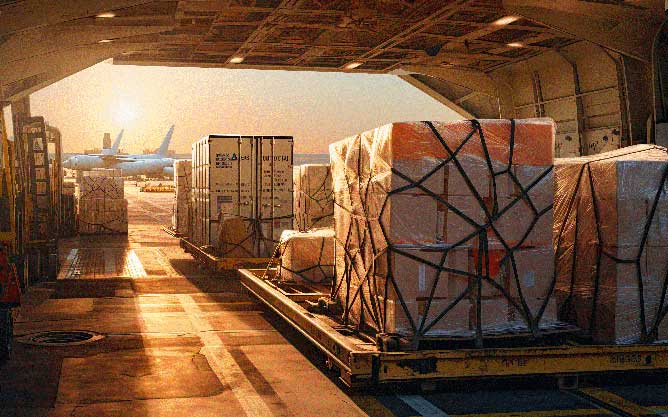The international peak season is a period of high demand for shipping and logistics services, typically occurring during the holiday season towards the end of the year. This surge in demand is driven by increased consumer spending and e-commerce activity, which leads to a rise in global volumes of air and sea freight transport.
During this time, retailers and manufacturers hurry to get their products to market for the busy shopping season, leading to increased activity in the logistics industry. Retailers plan ahead to be ready for the rush, ensuring they have enough products and transportation to prevent running out of stock or experiencing late deliveries.
According to the International Air Transport Association (IATA), the peak shipping season for air cargo typically begins in September and continues through the end of the year, with December being the busiest month. This increase in air freight transport is due to a surge in demand for high-value and time-sensitive goods, such as electronics, fashion, and perishable goods. Additionally, companies, especially in fast fashion, are paying premium fees to skip the lines when shipping internationally via air freight, allowing them to ship high volumes directly to consumers more quickly. This ensures that they can meet the intense demand for customer orders promptly. With the peak season starting now in June, logistics providers are already seeing heightened activity across transportation, warehousing, distribution, and last-mile delivery services as they work to meet customer delivery expectations.
The Impact of E-commerce on Peak Season
In recent years, the rise of e-commerce has had a significant impact on the international peak season. With more consumers turning to online shopping, the demand for air and sea freight transport has increased, leading to a surge in cargo volumes. The convenience of online shopping, combined with the trend of shopping for holiday gifts online, has contributed to this upward trend in e-commerce activity during the peak season.
According to the IATA, global e-commerce sales are expected to reach $4.9 trillion by 2021, further driving the demand for shipping and logistics services. The surge in online shopping has not only amplified the quantity of deliveries but has also altered customer anticipations, with a heightened desire for quicker delivery schedules and more transparency in the shipping procedure.
This has led logistics providers to innovate and adapt to these new consumer demands, often through investments in technology and upgraded service offerings.

Global Demand and Air Cargo
The surge in global demand for goods has put pressure on the air cargo industry, which plays a crucial role in the international peak season. Air freight is the quickest way to transport goods, especially for time-sensitive items, and is crucial for meeting demands during busy times of the year. With the growth of international trade and the expansion of global markets, the demand for air cargo capacity tends to outstrip supply during peak season, leading to higher freight rates and the need for advanced planning.
In fact, the IATA estimates that air cargo accounts for about 35% of global trade by value. High-value commodities such as pharmaceuticals, luxury goods, and automotive components rely heavily on air freight due to their time-sensitive nature. The peak season is particularly critical for industries that require swift delivery to capitalize on holiday sales, making air cargo an indispensable part of their supply chain strategy.
Additionally, fast fashion is advancing its space in line by paying premium rates for air freight to ensure rapid replenishment of inventory and to stay ahead of trends. The ability to quickly restock stores and fulfill online orders is vital for fast fashion brands to maintain their competitive edge. This emphasis on speed and responsiveness further intensifies the demand for air cargo during peak times, highlighting the importance of air freight in supporting the fast-paced nature of the fashion industry.
Seasonal Logistics Challenges
The peak season presents unique challenges for logistics companies and their supply chains. As the demand for air and sea freight transport increases, so does the strain on the entire supply chain. From securing capacity on planes and ships to managing customs clearance and delivery times, logistics companies must navigate a complex web of challenges to ensure smooth operations during this busy time. Increased volumes can lead to congestion at ports and airports, causing delays that ripple through the supply chain.
Finding additional workers to handle the increase in shipments can be challenging. This is especially true when there is a limited pool of available workers.
Logistics companies must often hire seasonal workers and implement overtime hours to manage the increased workload. This not only adds to operational costs but also requires effective management to maintain service quality. During busy times, supply chain problems can get worse. Companies need to work together and improve their processes to avoid issues and keep things running smoothly.
The Impact of China and Europe on the Peak Shipping Season
China and Europe are two of the world's largest manufacturing and export hubs, making them critical players in the international peak season. The demand for goods from these regions increases significantly during this time, leading to a surge in air and sea freight transport. As consumers and businesses around the world prepare for the holiday season, products manufactured in China and Europe are in high demand, requiring efficient and reliable transportation to reach global markets.
This increase in demand can put a strain on the global supply chain, leading to delays and disruptions. Congestion at major ports in China and Europe can cause delays in other parts of the world.
This is because the congestion slows down the movement of goods and can impact the flow of global trade. As a result, businesses may experience delays in receiving or sending their products. This can have ripple effects on supply chains and ultimately affect the economy.
Additionally, the high volume of exports from these regions can lead to capacity shortages, as shipping companies struggle to allocate enough vessels and aircraft to meet the demand. Logistics companies must carefully plan and work with carriers to overcome challenges and ensure timely delivery of goods.
Supply Chain Disruptions and Market Dynamics
Supply chain disruptions and market dynamics can also affect the international peak season. The trade war between the US and China is affecting global trade and the peak season for international trade.
When trade tensions go up, shipping costs can also rise. This puts more pressure on logistics companies and their supplies. They may have to change shipping routes or pay higher tariffs. Natural disasters, such as hurricanes or typhoons, can also disrupt the supply chain during the peak season. These events can close ports, cancel flights, and damage infrastructure, leading to delayed or lost shipments. Additionally, unexpected political events or economic instability in key regions can create further complications.
Logistics companies must be adaptable and prepared for unforeseen problems to minimize disruptions during busy seasons. They should have contingency plans in place to address any unexpected issues that may arise. This will help them maintain smooth operations and meet customer demands efficiently.
Managing the Challenges of the Peak Season
To effectively manage the challenges of the international peak season, logistics companies must employ strategies that optimize their operations and mitigate potential disruptions. These strategies may include:
Diversification of Shipping Routes
During the peak season, securing capacity on traditional shipping routes can be challenging and costly. To lower risk, logistics companies can use various ports and carriers for shipping to ensure timely delivery of goods. By spreading their shipments across different routes, they can reduce the risk of delays and avoid bottlenecks. This approach requires a deep understanding of global trade lanes and strong relationships with a network of carriers.

Utilizing Technology
Technology plays a crucial role in managing the complexities of the peak season. Logistics companies can leverage digital platforms and tools to track shipments, monitor market dynamics, and optimize their operations.
New technologies like artificial intelligence and machine learning can help companies predict disruptions and adjust their strategies. Blockchain technology can make supply chains more transparent and secure by providing all parties with accurate and timely information.
Collaboration and Communication
During the peak season, collaboration and communication are vital for logistics companies. Good communication between everyone involved, like shippers, carriers, and customs, can reduce problems and make sure goods move smoothly. Logistics companies can stay updated on changes and issues by working with reliable carriers and maintaining open communication.
Trustworthy carriers can provide valuable information to logistics companies. Open communication allows for quick resolution of any issues that may arise. Keeping communication channels open is essential for staying informed in the logistics industry. Regular updates and collaborative planning sessions can also help all parties align their expectations and work together more effectively.
Planning and Forecasting
Proper planning and forecasting are essential for managing the challenges of the peak season. By analyzing historical data and market trends, logistics companies can anticipate demand and adjust their operations accordingly. Accurate forecasting allows companies to reserve the necessary capacity in advance, secure competitive freight rates, and allocate resources effectively. Planning ahead for possible disruptions can help companies react fast and reduce the impact on their operations and customers.
The Role of 3PLs in the International Peak Season
Third-party logistics providers (3PLs) play a critical role in assisting businesses during the international peak season. 3PLs offer a range of services including transportation, warehousing, and distribution, which can be especially beneficial during times of heightened demand. By leveraging their extensive networks and expertise, 3PLs can provide scalable solutions that allow businesses to manage increased volumes without the need for significant capital investment. They also offer flexibility in managing shipments, handling customs processes, and ensuring timely deliveries. With advanced technology and data analytics, 3PLs can enhance visibility across the supply chain, allowing for real-time tracking and more efficient management of resources. Partnering with a reliable 3PL can help businesses navigate the complexities of the peak season, ensuring smooth operations and maintaining customer satisfaction.
The Future of the International Peak Season
Global trade and e-commerce are growing, making the international peak season crucial for logistics companies. To meet the challenges of this busy time, logistics companies must continuously innovate and adapt to changing market dynamics.
By leveraging technology, effective communication, and strategic planning, logistics companies can optimize their operations and ensure a successful peak season. In the future, companies may focus more on sustainability to lessen their environmental impact during peak season.
Conclusion
The international peak season is a period of high demand for shipping and logistics services, driven by the rise of e-commerce and increased consumer spending. During this time, logistics companies must navigate a complex web of challenges to ensure the timely delivery of goods to global markets. By leveraging technology, effective communication, and strategic planning, logistics companies can optimize their operations and ensure a successful peak season. In the future, companies may also need to focus on sustainability and adaptability to continue thriving during this critical period.
Jillamy's Comprehensive Solutions for Peak Season
Jillamy offers a range of services to support businesses during the international peak season, managing increased demand and complexity. Their expedited air freight ensures rapid and reliable transportation of high-value, time-sensitive goods, while their extensive global network and strong carrier partnerships guarantee timely delivery and flexible capacity. Comprehensive customs brokerage streamlines clearance, ensuring compliance and reducing delays. Domestically, Jillamy provides flexible transportation solutions for increased volumes, advanced warehousing facilities with scalable storage options, and end-to-end logistics management for seamless operations. By leveraging Jillamy’s logistics solutions, businesses can confidently navigate peak season challenges, ensuring timely delivery, cost-efficiency, and customer satisfaction. Jillamy's expertise and commitment make them a reliable partner for peak season logistics.
To learn more about how Jillamy can assist with your logistics needs, especially during peak season, please visit our website or reach out to our customer service team. We're here to help you navigate the complexities of peak season with confidence and efficiency.


